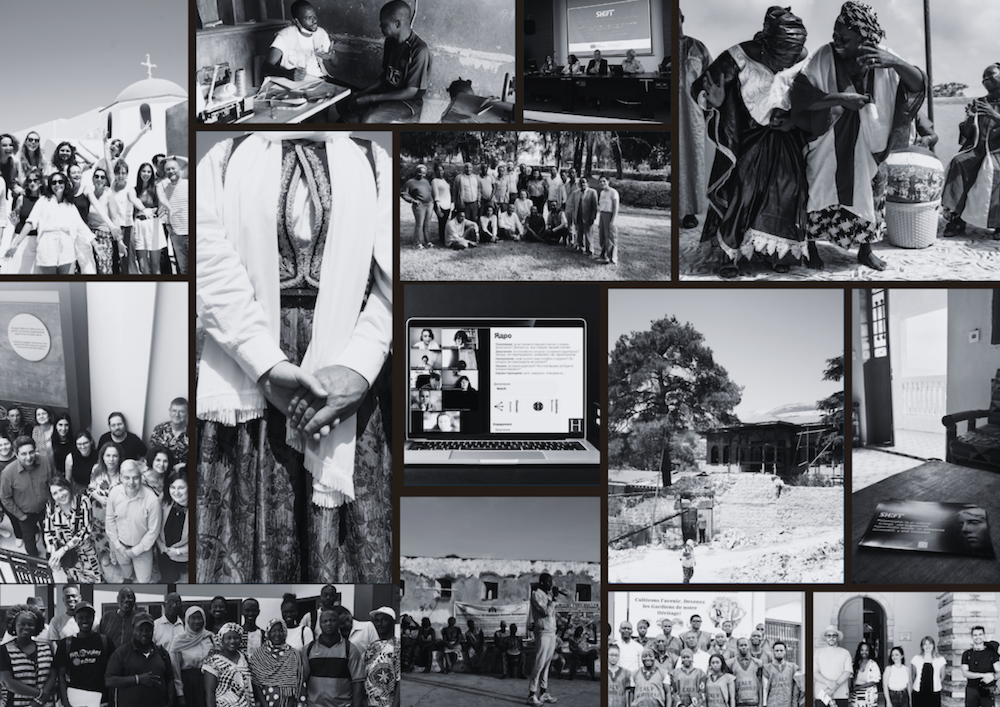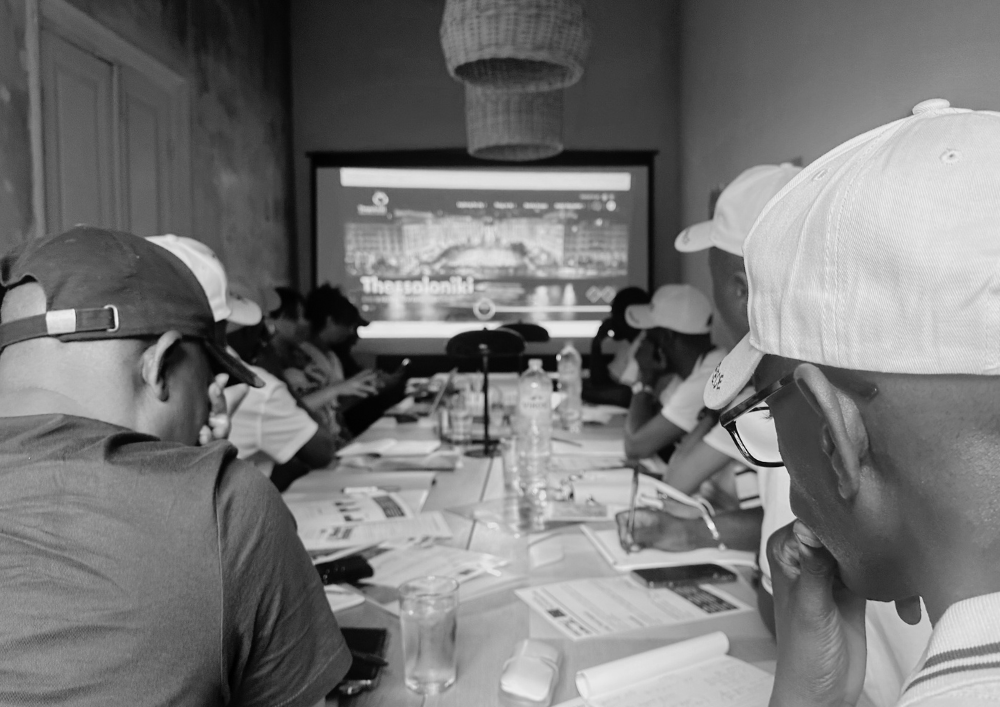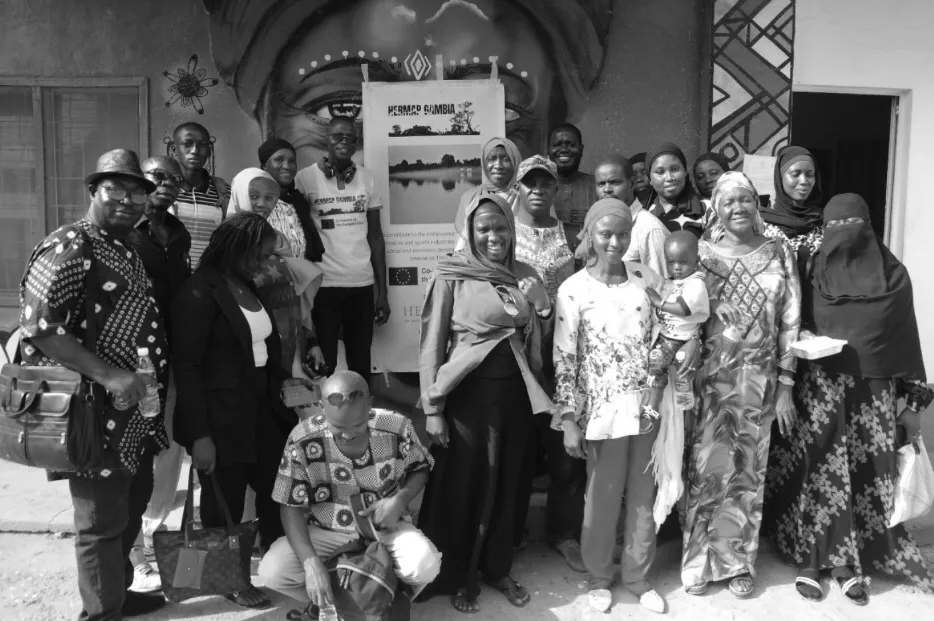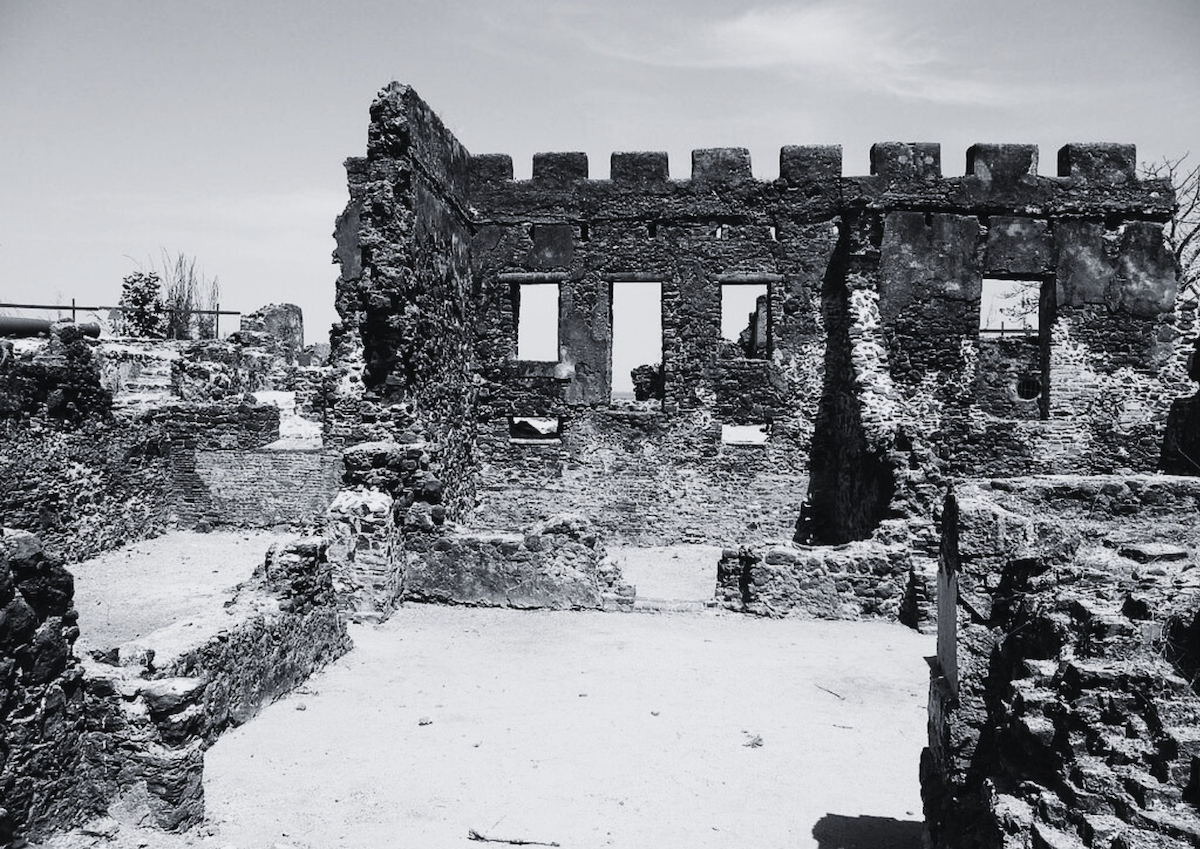: HerMaP Gambia
HERITΛGE in the News
Our teams are working around the world to fulfill the HERITΛGE mission. Here is how some of our work has been featured in the press in the last few months.
Heritage Threatened by Conflict
HERITΛGE has launched a new project to safeguard Ukraine’s cultural heritage. Architectural Heritage Preservation in Times of War: The Ukrainian Model is being realized in cooperation with the Kharkiv School of Architecture and Skeiron, with generous support from the U.S. Embassy’s Public Diplomacy Section in Ukraine. The project has been featured in the latest issue of Popular Archaeology as well as in Ukrainian media.
HerMaP Gambia
The Gambia’s National Assembly’s Committee for Culture and Tourism recently embarked on a Parliamentary Study Tour in Thessaloniki. This visit, conducted as part of the HerMaP Gambia program co-funded by the European Union, was widely covered in the Gambian media, including prominent news programs and The Voice newspaper.
Watch the QTV bulletin (start at 14:18) or read the article in The Voice.
HERITΛGE also delivered workshops in The Gambia on various aspects of cultural management, including Festival Management, which was covered by The Voice.
African Heritage Grants
HERITΛGE’s small grants for African heritage initiative, supported by the Mellon Foundation, recently funded Restoring Ilukwe House, a project by the NGO Legacy to restore a historic building in Lagos’ railway compound. Coverage of this initiative appeared in Nigeria’s The Guardian.
The Republic, a Nigeria-based magazine and platform of socio-economic and political commentary, criticism and cultural discourse, has received a substantial grant from the Mellon Foundation to support its mission to establish itself as a regional, leading hub/platform for Black and Africa-focused ideas and critical perspectives; and to further connect Africa and the African diaspora on critical issues, with the help of HERITΛGE.
Greek Living Heritage Network
As a founding member of the Living Heritage Network in Greece, HERITΛGE continues to support and celebrate Greece’s living heritage. Theodosia Maroutsi recently discussed the Network on NaMaste, a cultural program on Greece’s national broadcaster ERA2.
Greek speakers can listen to the show here.
Gambian Parliamentary Study Tour with HERITΛGE
In the framework of the EU-funded programme HerMap Gambia, HERITΛGE was honoured to host the Select Committee on Tourism, Arts, Culture, Youth and Sports of the National Assembly of the Gambia during a study tour to Greece that took place on 29th July – 4th August. The delegation was headed by the Honourable Seedy SK Njie, Deputy Speaker of the National Assembly of The Gambia and also included officials from the Gambia Tourist Board.
The purpose of the tour for the Honourable Members of the Parliament was to be guided through the Greek cultural and natural landscape and be presented with good practices and policies that helped the country develop its tourism and cultural industries, based on its heritage. Greece is one of the most popular tourist destinations in the world, hosting over 30 million tourists each year. Its cultural and natural heritage has always been an important component of its cultural and tourist industries and has become even more so in the last three decades with the country diversifying away from the sea-and-sun model to address the challenges posed by climate change, overtourism, and calls for sustainable development.
“The visit to Greece was a significant milestone in our efforts to enhance The Gambia’s tourism and heritage sectors,” the Committee said in a statement. “We are committed to leveraging the insights and connections made during this study tour to forge a successful bilateral cooperation with Greece. This collaboration will pave the way for comprehensive development, ensuring that The Gambia’s heritage sites and natural assets are preserved and promoted for future generations.”
HERITΛGE Director Dr. Evangelos Kyriakidis said: “At HERITΛGE we are particularly proud to have been able to collaborate with the Select Committee on Tourism, Arts, Culture, Youth and Sports of the National Assembly of the Gambia for this impactful tour that included training and benchmarking in the fields of heritage and heritage-based tourism. The study tour is one of the actions delivered by the EU-funded HerMaP Gambia program and has strengthened our cooperation with the Honourable Members with the aim of advancing the heritage and tourism sectors in The Gambia.”
During its week-long stay, the delegation realized a number of benchmarking visits to important heritage sites including the Museum of the Royal Tombs Aigai, the Polycentric Museum of Aigai, the White Tower, the Rotunda Monument, the Heptapyrgion fortress, and the Allied Military Cemetery and Memorial in Thessaloniki, the Metohi of the Agios Panteleimonas Monastery in Flogita with its newly created Centre of Byzantine Civilization and Exhibition on the Greek Revolution in Halkidiki, and the site of the Ancient City of Olynthos.
Cultural professional and Managing Director of SYMVOLI Conference & Cultural Management, Vicky Papadimitriou, introduced the delegation to the structure of the Greek cultural and tourism industries, giving an overview of the successes and challenges they have faced in the past century. The former Deputy Mayor of Thessaloniki, Spyros Pegkas, addressed the Delegation and presented how the City’s strategy to attract visitors and grow its economy was created around its multi-cultural past and rich cultural heritage in the early 2010’s. Dr. Prodromos Monastiridis, President of the Thessaloniki Convention Bureau presented the city’s strategy to attract visitors in a professional capacity. Sylvia Koumedaki, Co-founder and General Manager of Chef Stories, a marketing and consulting agency focusing on traditional gastronomy and tourism, gave the honourable members an overview of how food and agricultural heritage served as building blocks not just of community identity and preservation efforts, but also of efforts to attract visitors to the regions of Thessaloniki and Halkidiki and grow exports.
Archaeologist and museologist Yiannis Karliabas of the Thessaloniki Ephorate of Antiquities, talked to the delegation about history and oral history narratives and the opportunities and challenges faced by the team of heritage professionals working with Heptapyrgion, a monument with a long and often complicated history. Following the benchmarking visits the delegation had the opportunity to discuss with Archaeologists and Tour Guide Konstantinos Papastathis from the Ministry of Culture, Archaeologist and Tour Guide Tasos Papadopoulos, and Archaeologist, Museologist, and Tour Guide Georgios Adamidis. The delegation also held a discussion and explored wider opportunities for cooperation with Perrotis College and American Farm School President, Dr. Jeff Lansdale following a tour of their extensive facilities.
Finally, the delegation had the opportunity to attend a Heritage Management workshop delivered by Dr. Anastasia Sakellariadi.
Heritage Management and Team Development Training in the Gambia
Twenty National Centre for Arts and Culture (NCAC) heritage managers attended an Introduction to Heritage Management and Team Development training delivered on June 25th. The training was designed and delivered as part of the HerMaP program, which is co-funded by the European Union. HerMaP Gambia strongly supports gender equality and youth engagement by fostering an enabling environment through capacity development initiatives.
The training was delivered to both new and existing NCAC staff with the aim of enhancing their knowledge of heritage management and efficiently integrating new members into established teams, while supporting the NCAC’s mandate to ensure equitable gender representation at the UNESCO World Heritage Sites it oversees.
HERITΛGE Director, Dr Evangelos Kyriakidis, delivered the Introduction to Heritage Management training while Mamat Sallah, Assistant Director of Museums and Monuments at NCAC introduced trainees to the Mission, Vision, Mandates and Scheme of Service of NCAC.
Mina Morou and Eirini Oikonomidi, HerMaP Gambia Project Manager and Assistant Project Manager respectively, introduced trainees to team integration.
The module introducing trainees to heritage management aims to introduce the concepts of heritage and differentiate between tangible and intangible heritage, review the historical reasons for heritage categories and train participants in value-based management principles. The trainees lean how intangible heritage knowledge can inform effective heritage management strategy, to identify the role of heritage managers in the Gambia and recognize the importance and benefits of engaging with local communities.
During the training, participants gained valuable insights into team integration, including an introduction to team development and the role of culture in shaping effective teams. They learned to balance team and individual dynamics while understanding the critical role of psychological safety. In addition, they gained skills to identify and address common team development challenges, enhancing their ability to foster a cohesive and productive team environment.
Find out more about HerMaP Gambia here.
2023- 2024: Our academic year in review
 On Saturday, June 30th, the HERITΛGE team wrapped up the 2023-2024 academic year with an event on the Greek island of Paros island to mark the end of our Community Engagement for Cultural Heritage Summer Field School. The event was the culmination of possibly the most successful academic year since the organization was founded 15 years ago.
On Saturday, June 30th, the HERITΛGE team wrapped up the 2023-2024 academic year with an event on the Greek island of Paros island to mark the end of our Community Engagement for Cultural Heritage Summer Field School. The event was the culmination of possibly the most successful academic year since the organization was founded 15 years ago.
During the last 12 months, HERITΛGE completed 40 training activities that included online and in-person workshops, two hybrid summer schools, and an academic Certificate program bearing ECTS credits, delivered in cooperation with HOGENT University in Belgium. Over 650 heritage managers and caretakers were trained in managing heritage assets, independent of project specifics.
We expanded our curriculum with a new conservation course, First Aid for Finds. The 3-day online workshop complements the Introduction to the General Principles of Cultural Heritage Conservation workshop we introduced in the academic year 2022-2023. In the past year, we also ran two successful pilot programs in Interpreting Heritage and Engaging Communities for Climate Change and in Community and Economic Development, focusing on community-based tourism. Both will form part of our 2024-2025 academic year training offerings.
We also expanded our partnership with the Mellon Foundation through our HerMaP Africa program, funded by the Foundation’s Humanities in Place initiative. Through HerMaP Africa we have already awarded 60 grants and 60 fellowships to heritage organizations and professionals across Africa. Through HerMaP Gambia, a program co-funded by the European Union, we continued to work to strengthen The Gambia’s heritage sector in order to contribute to the creation of more and better jobs for the country.
Thanks to the British Council, our project in Pakistan on the protection of Buddhist rock carvings in Swat (in partnership with the Italian Mission and EssaNoor Associates) has gotten off the ground. Our J.M. Kaplan Fund work in Iraq has been completed and so has our Creative Europe project in Ukraine, training heritage managers in digital storytelling for Ukrainian Museums – together with Ukrainian partners. Our cooperation with Aliph and local partners enabled us to contribute to the efforts to safeguard local heritage in the aftermath of last year’s catastrophic earthquakes in Turkey and Syria. This academic year we also helped create the Living Heritage Network which aims to bring together and empower all organizations and individuals working with Greek living heritage.
Meanwhile, we continued working with some of Europe’s best-known academic and research institutions as well as heritage organizations and private businesses to make cultural heritage more accessible and inclusive through SHIFT, a project funded by the European Union’s Horizon Europe program.
Finally, earlier in 2024 we started working on AHEAD, another Creative Europe program, this time aiming to strengthen European cultural heritage institutions’ audience development efforts.
These are most but by no means all the projects our team is working on, all the while expanding HERITΛGE’s impact and outreach efforts. Stay tuned for more!
The significance of Kunta Kinteh island and related sites
By Ebrima Jammeh*
The Gambia is the smallest country on mainland Africa, with a population of about 2 million people. It is often referred to as the smiling coast of Africa due to the friendly nature of its people. It is surrounded on all three sides by Senegal (North, South, and East) except the West, which is occupied by the Atlantic Ocean, and is divided into two halves (North and South) by the River Gambia (a freshwater river).
Having gained independence from the British in 1965, it became a Republic in 1970 under the Leadership of President Dawda Kairaba Jawara.
Kunta Kinteh Island and Related Sites: Outstanding Universal Value
Kunta Kinteh Island, formerly known as James Island, and its related sites, are a testimony to the encounter between Africa and Europe along the River Gambia, a period stretching from pre-colonial and pre-slavery times to independence. The site is particularly significant for its relation to both the beginning of the slave trade and its abolition and also documents early access to the interior of Africa.
Kunta Kinteh is a small island in the Gambia River which flows out into the Atlantic Ocean. The island’s location made it a strategic place to control the waterway. Visited by explorers and merchants in their search for a sea route to India, it became one of the first cultural exchange zones between Africa and Europe. By 1456 the Island had been acquired by Portugal from local rulers and the construction of a fort began. Kunta Kinteh Island and Related Sites form an exceptional testimony to the different facets and phases of the African-European encounter, from the 15th to the 19th centuries. The River Gambia was particularly important forming the first trade route to the inland of Africa. The site was already a contact point with Arabs and Phoenicians before the arrival of the Portuguese in the 15th century. The region forms a cultural landscape, where the historic elements are retained in their cultural and natural context. The properties illustrate all the main periods and facets of the various stages of the African-European encounter from its earliest moments in the 15th Century through the independence period.
The main focus of the Kunta Kinteh Island site was the control of the hinterland and its riches rather than control of the coast and the trade that passed along it.
The specific location of Kunta Kinteh Island and its Related Sites, at the mouth of the Gambia River, is a tangible reminder of the story of the development of the Gambia River as one of the most important waterways for trade of all kinds from the interior to the Coast and beyond. The specific, important role of the site in the slave trade, both in its propagation and its conclusion, makes Kunta Kinteh Island and its Related Sites an outstanding memory of this important, although painful, period of human history.
The property includes Kunta Kinteh Island Fort and a series of sites associated with the early European occupation of the African continent. The ensemble has seven separate locations: the whole of Kunta Kinteh Island, the remains of a Portuguese Chapeland of a colonial warehouse (CFAO Building) in the village of Albreda, the Maurel Frères Building in the village of Juffureh, the remains of the small Portuguese settlement of San Domingo, as well as Fort Bullen and the Six-Gun Battery. Fort Bullen and the Six-Gun Battery are at the mouth of the Gambia River, whilst Kunta Kinteh Island and the other sites are some 30 km upstream.
The development of Kunta Kinteh Island differed greatly from that of the many other forts, castles, and trading posts found in other parts of West Africa in that the main focus of the Kunta Kinteh Island site was the control of the hinterland and its riches rather than control of the coast and the trade that passed along it.
The Six-Gun Battery (1816) and Fort Bullen (1826), located on both sides of the mouth of the River Gambia came much later than Kunta Kinteh Island and were built with the specific intent of thwarting the trade in slaves once it had become illegal in the British Empire after the passing of the Abolition Act in 1807. They are the only known defensive structures in the region to have been built specifically to stop slaving interests. The other fortifications of the region (including Kunta Kinteh Island), were constructed as a means of enhancing and controlling the trade in slaves (and commodities) rather than stopping it. These two military positions allowed the British to take full control of the River Gambia, eventually paving the way for the establishment of the colonial government, a period well-illustrated by many colonial buildings in Banjul and the Governor’s Rest House at Fort Bullen. Finally, Fort Bullen shows evidence of its re-use during the Second World War (1939-1945) as a strategic observatory and artillery post. This later period illustrates yet another European rivalry that spread to the African continent.
The Six-Gun Battery (1816) and Fort Bullen are the only known defensive structures in the region to have been built specifically to stop slaving interests.
Site Significance
Criterion (iii): Kunta Kinteh Island and related sites on the River Gambia provide an exceptional testimony to the different facets of the African-European encounter, from the 15th to 20th centuries. The river formed the first trade route to the inland of Africa, being also related to the slave trade.
Criterion (vi): Kunta Kinteh Island and related sites, the villages, remains of European settlements, the forts and the batteries were directly and tangibly associated with the beginning and the conclusion of the slave trade, retaining its memory related to the African Diaspora.
Integrity: The six parts of the serial nomination together present a testimony to the main periods and facets of the Afro-European encounter along the River Gambia, a continuum that stretched from pre-colonial and pre-slavery times to the period of independence and in particular to the beginning and the abolition of the slave trade, as well as documenting the functions of the early access route to the inland of Africa. The six sites encompass all the key remains.
All the sites except the CFAO and Maurel Frères Buildings are ruins. The CFAO Building has been restored and provided with adequate sea defense. The Maurel Frères Building was restored in 1996 and is in a good state of conservation. The Portuguese chapel and San Domingo are in a state of ruins, but these have been stabilized, with the most endangered parts reinforced in 2000.
The isolated position of Kunta Kinteh Island in the river has conserved its setting to the present day. Fort Bullen is also bordered by the river on one side and a large open tract of land on the other, naturally serving as a buffer zone and helping to preserve its setting. It is in a relatively good state of conservation, though the wall on the seaward side is suffering from sea erosion. Parts have collapsed and 20 metres were rebuilt in 2000. The Six-Gun Battery is in a good state of conservation. The ruined sites need ongoing maintenance if they are not to deteriorate over time.
Authenticity: Kunta Kinteh Island Fort was subjected to destruction on numerous occasions. Since the last time by the French, in 1779, it has remained a ruin with only minor attempts at consolidation and minimizing the effects of sea erosion. The Island is a landmark for all concerned with the slave trade, especially the local community and Africans in the Diaspora. Apart from a short period of re-use during the Second World War. Fort Bullen and the Six-Gun Battery were similarly abandoned in the late 19th century. At San Domingo, there are very few visible remains but the area has considerable potential for archaeological research. The ruins that convey the Outstanding Universal Value are extremely vulnerable to erosion. At the time of inscription to the UNESCO World Heritage List, the ruined sites were seen to be part of a wider cultural landscape that needed protection to protect the setting of the sites and to allow them to be understood.
Protection and management requirements
Kunta Kinteh Island, Fort Bullen and all the significant historic buildings in the Albreda-Juffureh complex are legally protected as National Monuments (1995) under the National Council for Arts and Culture Act, 1989 (revised 2003). The proclamation instrument also establishes a buffer zone for all the sites that should be kept free of incompatible developments with adverse effects on their setting. As National Monuments the historic structures are under the custodianship of the National Centre for Arts and Culture (NCAC) who are responsible for their conservation and upkeep. Day-to-day management rests with the Directorate of Cultural Heritage of the NCAC, which employs a Destination Manager, Showroom attendant, site attendants and caretakers. The Six-Gun Battery is located within the State House grounds and is protected by the Office of the President. The sites also have a 5-year management plan that sets out what is acceptable at the individual site and at the national level. This plan was prepared as a result of the joint effort of ten different national and local organizations, supported by the Africa 2009 program.
The funding used for the management and maintenance of the sites is relatively limited and comes mainly from entrance fees. Every three months, the Head of the Museums and Monuments section of the NCAC performs a physical inspection of the sites. This conditional assessment is carried out with a representative of the local stakeholders and, if possible, with a local guide. A brief report is prepared after each visit and these are summarized in an annual report.
To the visitors, the property has symbolic and emotional significance, as a visit to Kunta Kinteh Island is a pilgrimage to their roots. As a piece of historical evidence, much can be learnt from the Island, and it already forms part of the history and social studies syllabus in Gambian schools.
The property contains very fragile ruins that need to be protected and conserved as the tangible elements that convey Outstanding Universal Value. There needs to be ongoing maintenance, monitoring, and conservation to allow these ruins to have the best chance of survival and be robust enough to withstand the onslaughts of nature.
Challenges Include:
- Inadequate funding to ensure constant preservation
- Climate change factors such as erosion sea level rise, weathering
- Treasure hunting
- Inadequate capacity building among the staff
Strengths: The local community is being engaged at all levels while The Gambia has in place an effective and efficient legal framework in the management system. The site’s staff is a committed team that is receiving training in heritage management from the NCAC’s partner organization, HERITΛGE, through its HerMaP Gambia program, co-funded by the European Union.
PARTNERS
The National Centre for Arts and Culture partners with the following:
HERITΛGE through its HerMaP Gambia program that is co-funded by the European Union.
UNESCO
NATCOM
Coalition of Sites of Conscience
African World Heritage Fund (AWHF)
Gambia Tourism Board (GT BOARD)
Gambia Tourism and Hospitality Institute (GTHI)
*Ebrima Jammeh is Destination Manager for The Gambia’s National Centre for Arts and Culture (NCAC). This work was first presented at the 5th World Heritage Site Managers Forum that took place earlier this year in Saudi Arabia.
Preserving Africa’s Rich Heritage: Our Initiatives
As the world celebrates African Heritage Day on May 5th, we highlight our initiatives aimed at conserving, preserving, and promoting Africa’s diverse cultural legacy. The Heritage Management Organization (HERITΛGE), in collaboration with the Mellon Foundation and the European Union, stands at the forefront of conservation and community engagement, catalyzing efforts to safeguard and celebrate Africa’s invaluable natural and cultural heritage. Here are three important ways HERITΛGE is currently contributing to the preservation and promotion of African Heritage
- HerMaP Africa: HERITΛGE, in partnership with the Mellon Foundation, has embarked on a mission to fortify its country-specific programs across the African continent. A substantial $5 million grant, with support from the Mellon Foundation’s Humanities in Place program, has been instrumental in empowering local organizations and enhancing their capacity to preserve heritage and culture. Notably, Ethiopia, Ghana, and Rwanda, among other regions, benefit from this collaborative effort through initiatives like HERITΛGE’s HerMaP Gambia program. This funding injection includes $1 million allocated for small grants to African organizations and a $450,000 fellowship program aimed at nurturing heritage leaders. Such initiatives not only safeguard Africa’s cultural treasures but also foster socio-economic development, ensuring that heritage remains a vibrant force for progress.
- Africa Grants Program: HERITΛGE is proud to announce the launch of its Africa Grants Program, designed to support grassroots heritage projects across the continent. Ranging from $5,000 to $50,000, these small grants target organizations, groups, and individuals committed to preserving and promoting local heritage for socio-economic development. This initiative, part of the broader HerMaP-Africa project, is made possible through the generous backing of the Mellon Foundation’s Humanities in Place program. We have already allocated the first 19 grants and are on track to announce at least 30 more by the end of 2024. By empowering local stakeholders and fostering community-led initiatives, the Africa Small Grants Program not only safeguards Africa’s cultural tapestry but also nurtures its potential as a driver of sustainable development.
- HerMaP Gambia: In a groundbreaking collaboration co-funded by the European Union, HERITΛGE spearheads the HerMaP Gambia initiative, aimed at elevating the cultural and creative industries within The Gambia. Since its inception in 2020, HerMaP Gambia has served as a beacon of progress, harnessing the power of culture to catalyze social and economic advancement. At its core, HerMaP Gambia seeks to enrich the understanding and appreciation of Gambian cultural heritage while enhancing the capacity of key stakeholders in the cultural sector. By nurturing the management and appreciation of Gambian cultural heritage, this initiative paves the way for sustainable socio-economic growth, creating avenues for job creation and community development.
As we commemorate African Heritage Day, let us recognize the tireless efforts of local communities in Africa and their supporters to steward and harness the continent’s amazing heritage. Through collaborative initiatives, targeted grants, and visionary programs, cultural treasures are safeguarded and their potential is unlocked to catalyze progress and prosperity across the African continent. Together, let us celebrate and protect the invaluable legacy of Africa’s diverse heritage for generations to come.






